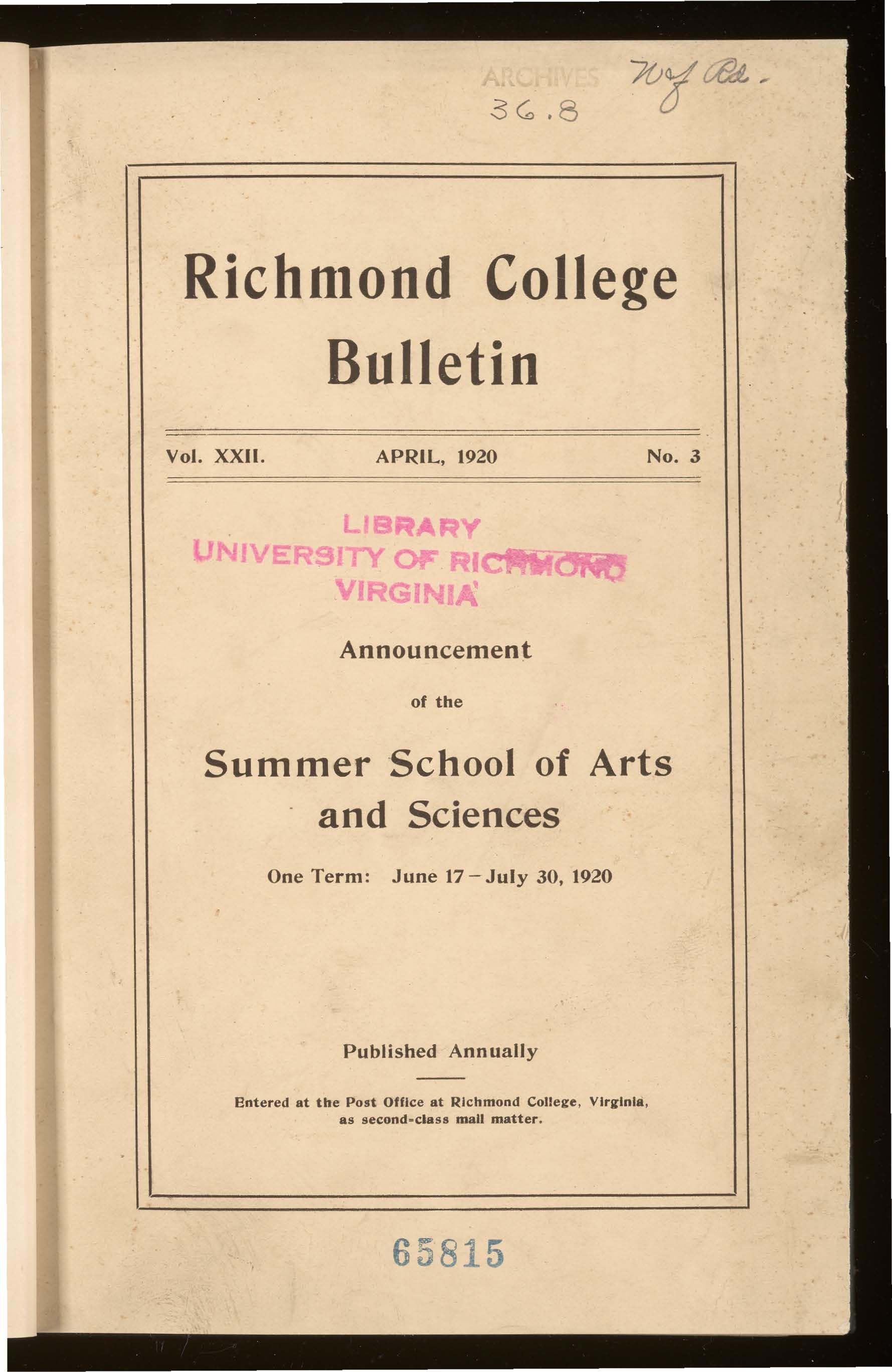
One Term: June 17 - July 30, 1920

Vol. XXII. APRIL, 1920
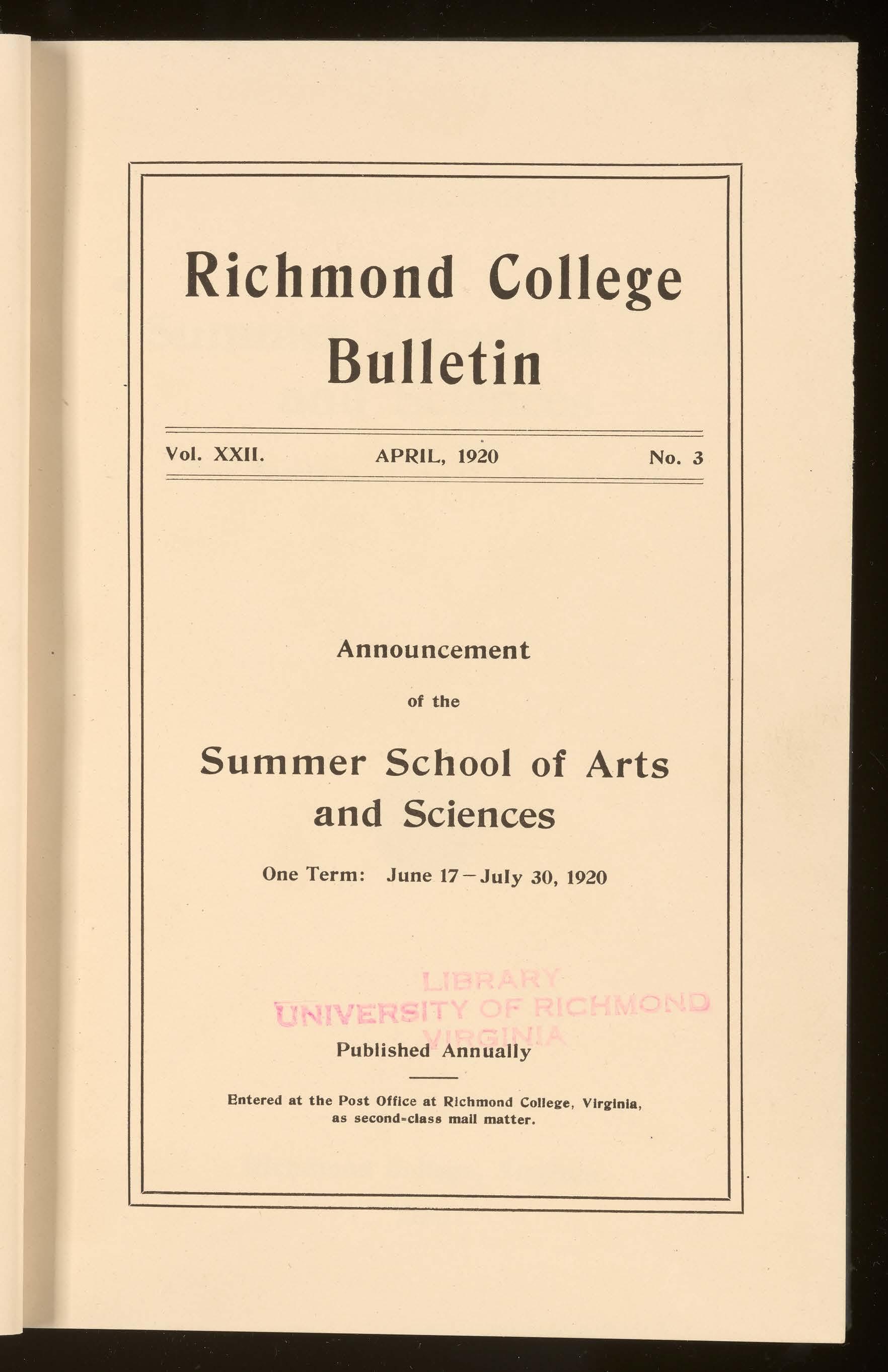
One Term: June 17-July 30, 1920
Published Annually
Entered at the Post Oflice at Richmond Colle11:e , Virginia , as second - class mall matter
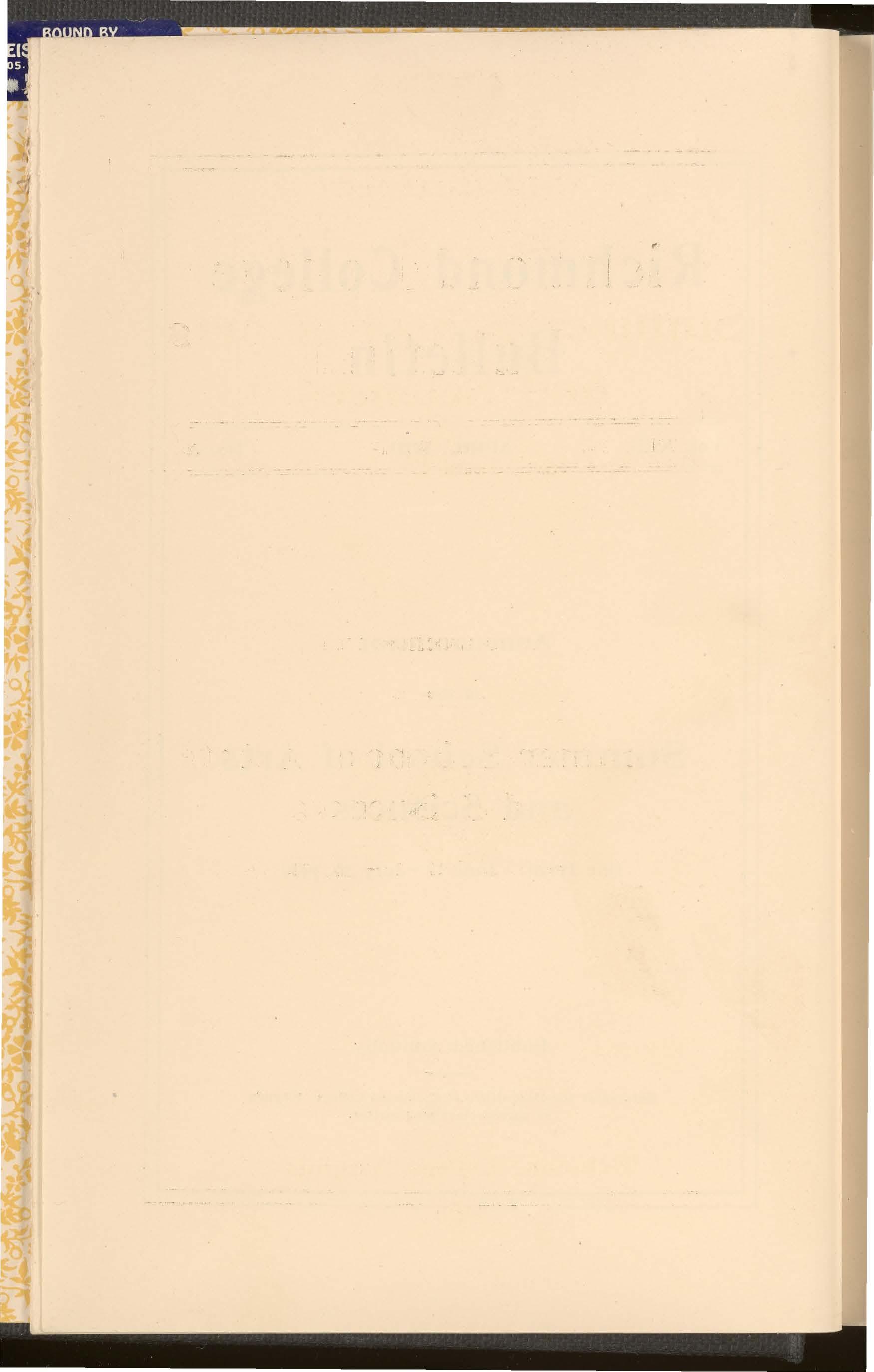


One Term: June 17 - July 30, 1920

Vol. XXII. APRIL, 1920

One Term: June 17-July 30, 1920
Published Annually
Entered at the Post Oflice at Richmond Colle11:e , Virginia , as second - class mall matter

One Session: June 17-July 30, 1920
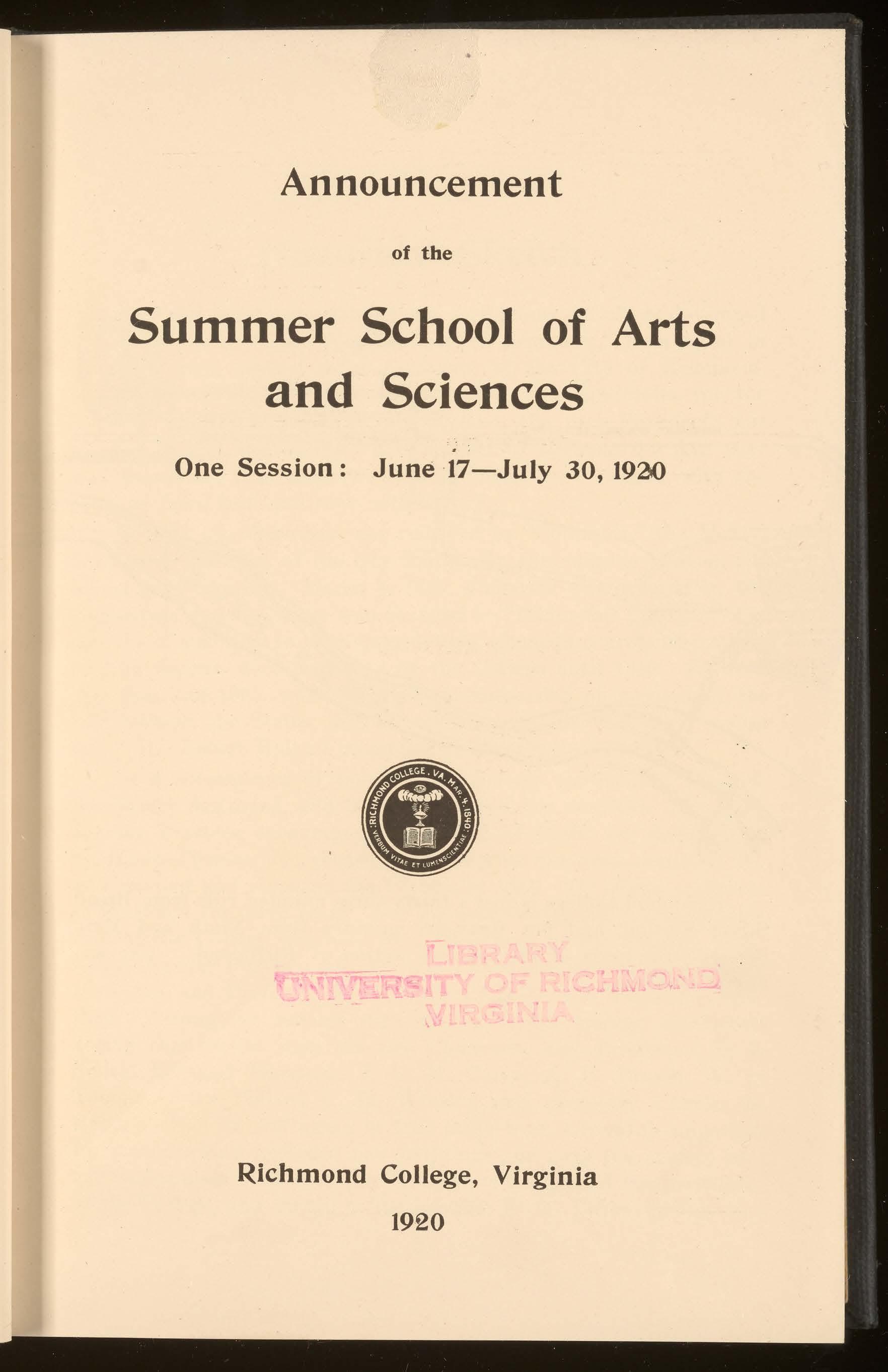
Richmond College, Virginia
1920
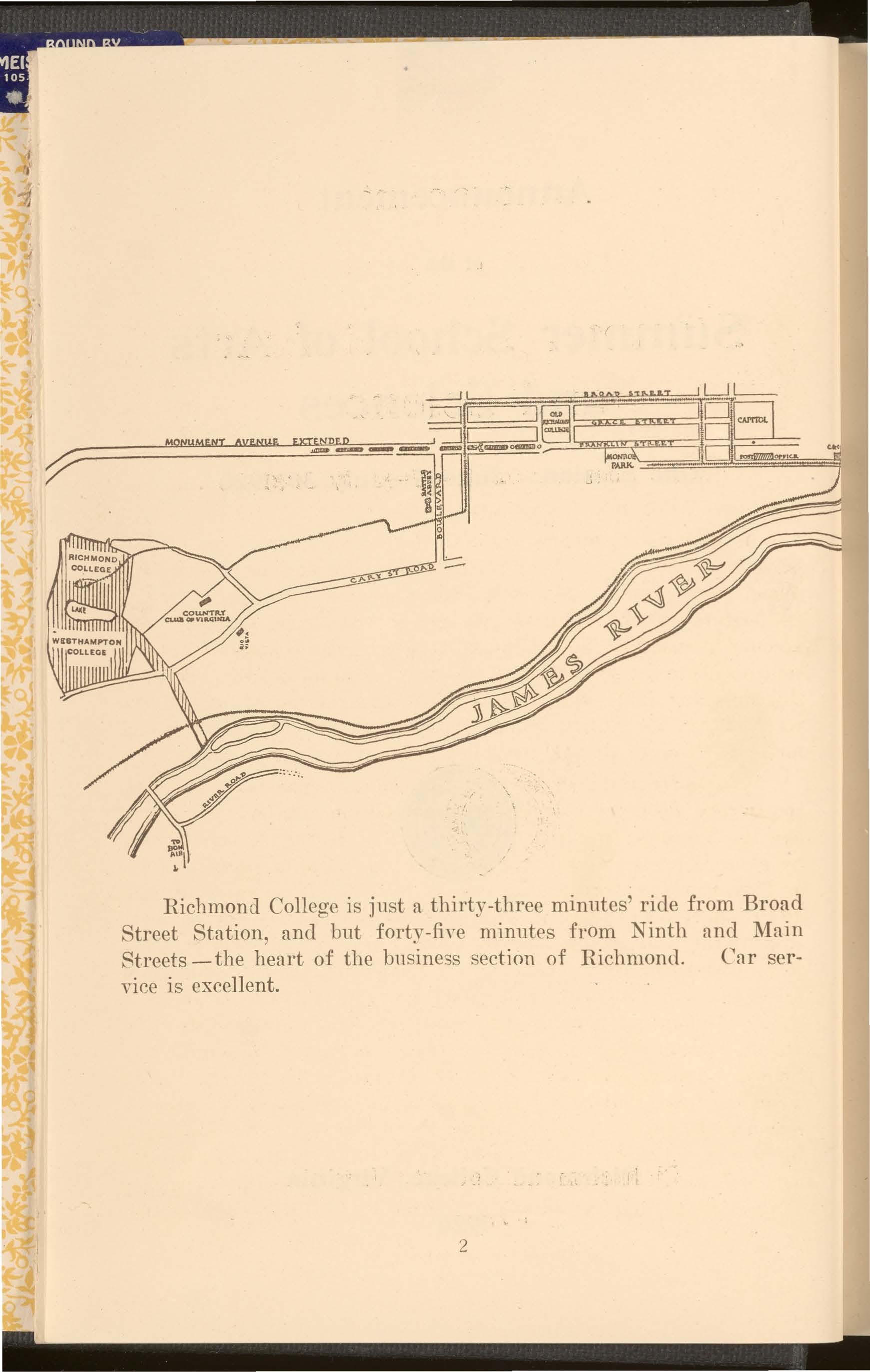
Richmond College is just a thirty-three minutes' ride from Broad Street Station, and but forty-fiYe minutes from Ninth and Main Streets - the heart of the bnsiness section of Richmond. Car service is excellent.
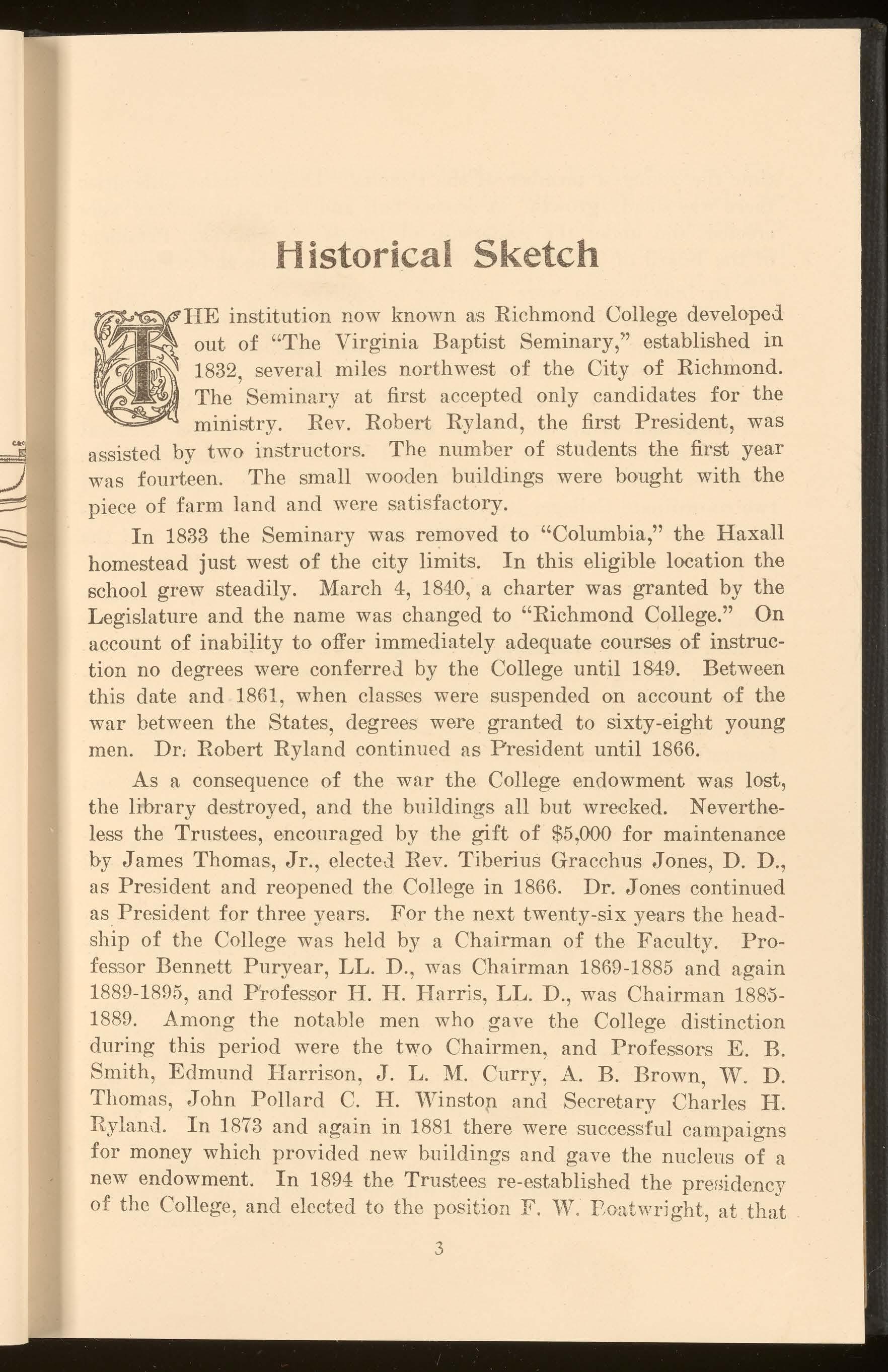
,r_,,,,.__,..,., __.,.,;,HE institution now known as Richmond College developed out of "The Virginia Baptist Seminary," established in 1832, several miles northwest of the City of Richmond. The Seminary at first accepted only candidates for the ministry. Rev. Robert Ry land, the first President, was assisted by two instructors. The number of students the first year was fourteen. The small wooden buildings were bought with the piece of farm land and were satisfactory.
In 1833 the Seminary was removed to "Columbia," the Haxall homestead just west of the city limits. In this eligible location the school grew steadily. March 4, 184.0, a charter was granted by the Legislature and the name was changed to "Richmond College." On account of inability to offer immediately adequate courses of instruction no degrees were conferred by the College until 1849. Between this date and 1861, when classes were suspended on account of the war between the States, degrees were granted to sixty-eight young men. Dr; Robert Ryland continued as President until 1866.
As a consequence of the war the College endowment was lost, the library destroyed, and the buildings all but wrecked. N evertheless the Trustees, encouraged by the gift of $5,000 for maintenance by James Thomas, Jr., elected Rev. Tiberius Gracchus Jones, D. D., as President and reopened the College in 1866. Dr. Jones continued as President for three years. For the next twenty -six years the headship of the College was held by a Chairman of the Faculty. Profes s or Bennett Puryear, LL. D., was Chairman 1869-1885 and again 1889-1895, and Professor I-I. I-I. Harris, LL. D., was Chairman 18831889. Among the notable men who gave the College distinction during this period were the two Chairmen, and Professors E. B. Smith, Edmund Harrison, J. L. M. Curry, A. B. Brown, ,v. D. Thomas, John Pollard C. I-I. ,vinstoµ nnd Secretary Charles I-I. Ryland. In 1873 and again in 1881 there were successful campaigns for money which provided new buildings and gave the nucleus of a new endowment. In 1894 the Trustees re-established the prei;idency of the College, and elected to the position F. W . Poatwright, nt that
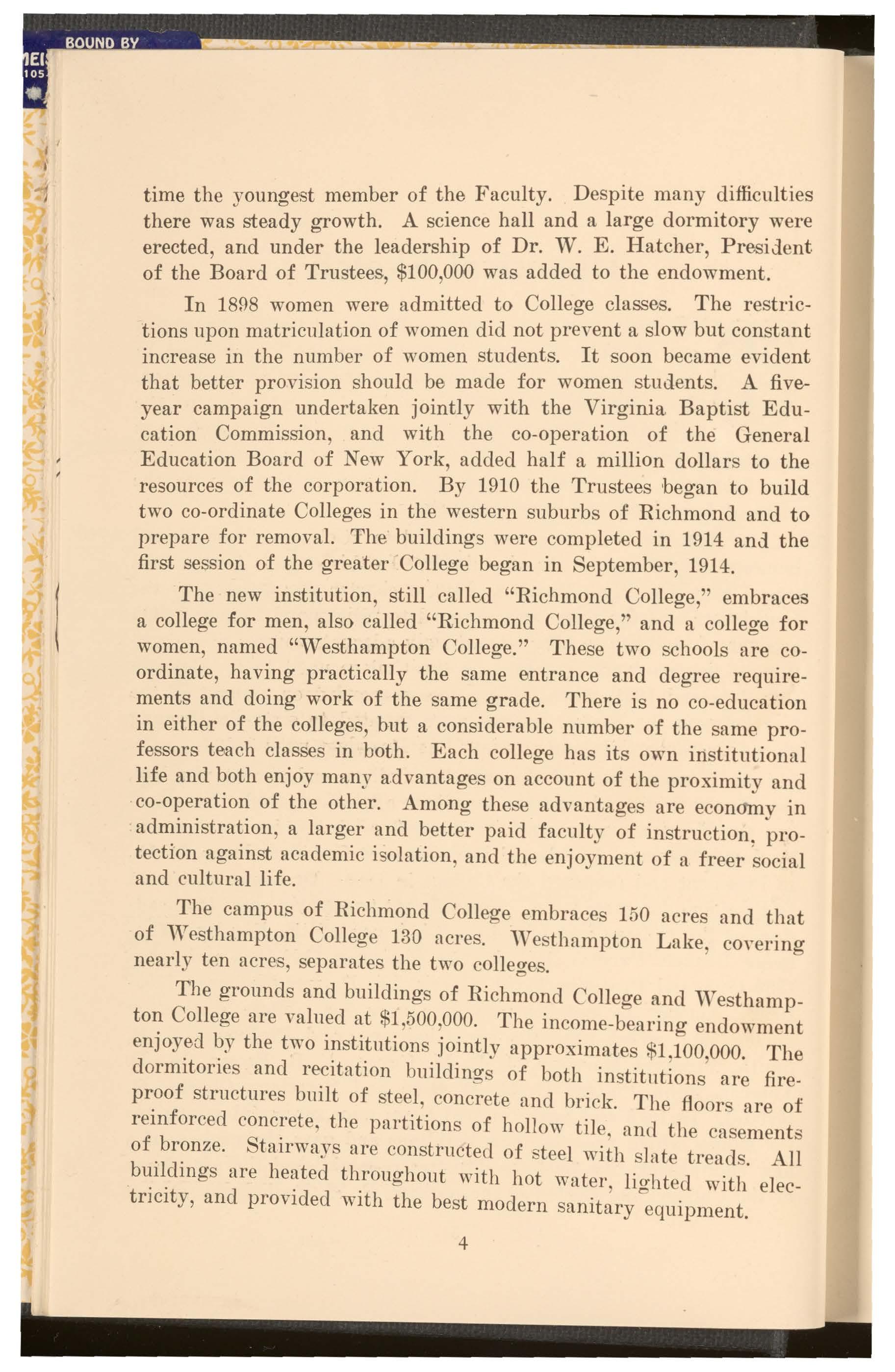
time the youngest member of the Faculty. Despite many difficulties there was steady growth. A science hall and a large dormitory were erected, and under the leadership of Dr. W. E. Hatcher, PresiJent of the Board of Trustees, $100,000 was added to the endowment.
In 1898 women were admitted to College classes. The restrictions upon matriculation of women did not preYent a slow but constant increase in the number of women students. It soon became evident that better provision should be made for women students. A fiveyear campaign undertaken jointly with the Virginia . Baptist Education Commission, and with the co-operation of the General Education Board of New York, added half a million dollars to the resources of the corporation. By 1910 the Trustees began to build two co-ordinate Colleges in the western suburbs of Richmond and to prepare for removal. The buildings were completed in 1914 anJ the first session of the greater College began in September, 1914.
The new institution, still called "Richmond College," embraces a college for men, also called "Richmond College," and a college for women, named "Westhampton College." These two schools are coordinate, having practically the same entrance and degree requirements and doing work of the same grade. There is no co-education in either of the colleges, but a considerable number of the same professors teach classes in both. Each college has its own institutional life and both enjoy many a.dvantages on account of the proximity and co-operation of the other. Among these advantages are econd'my in administration, a larger and better paid faculty of instruction, protection against academic isolation, and the enjoyment of a freer social and cultural life.
The campus of Richmond College embraces 150 acres and that of ,vesthampton College 130 acres. ,vesthampton Lake, conrmg nearly ten acres, separates the two colleges.
The grounds and buildings of Richmond College and \Yesthampton College are valued at $1,500,000. The income-bearing endowment enjoyed by the two institutions jointly approximates $1,100,000. The dormitories and recitation buildings of both institntions are fireproof structures built of steel, concrete and brick. The floors are of reinforced concrete, the partitions of hollow tile, and the casements of bronze. Stairways are constructed of steel with slnte treads. All buildings are heated throughout with hot water lio-htecl with electricity, and provided with the best modern sanit~ry c-equipment.
Direct communication is maintained with the heart of the City of Richmond by street cars, which enter the campus and make the trip for a five-cent fare. Faculty and students of both colleges have opportunity to enjoy all the advantages of a world-famous capital city and, at the same time, to live and study in the quiet of a beautiful suburban park.
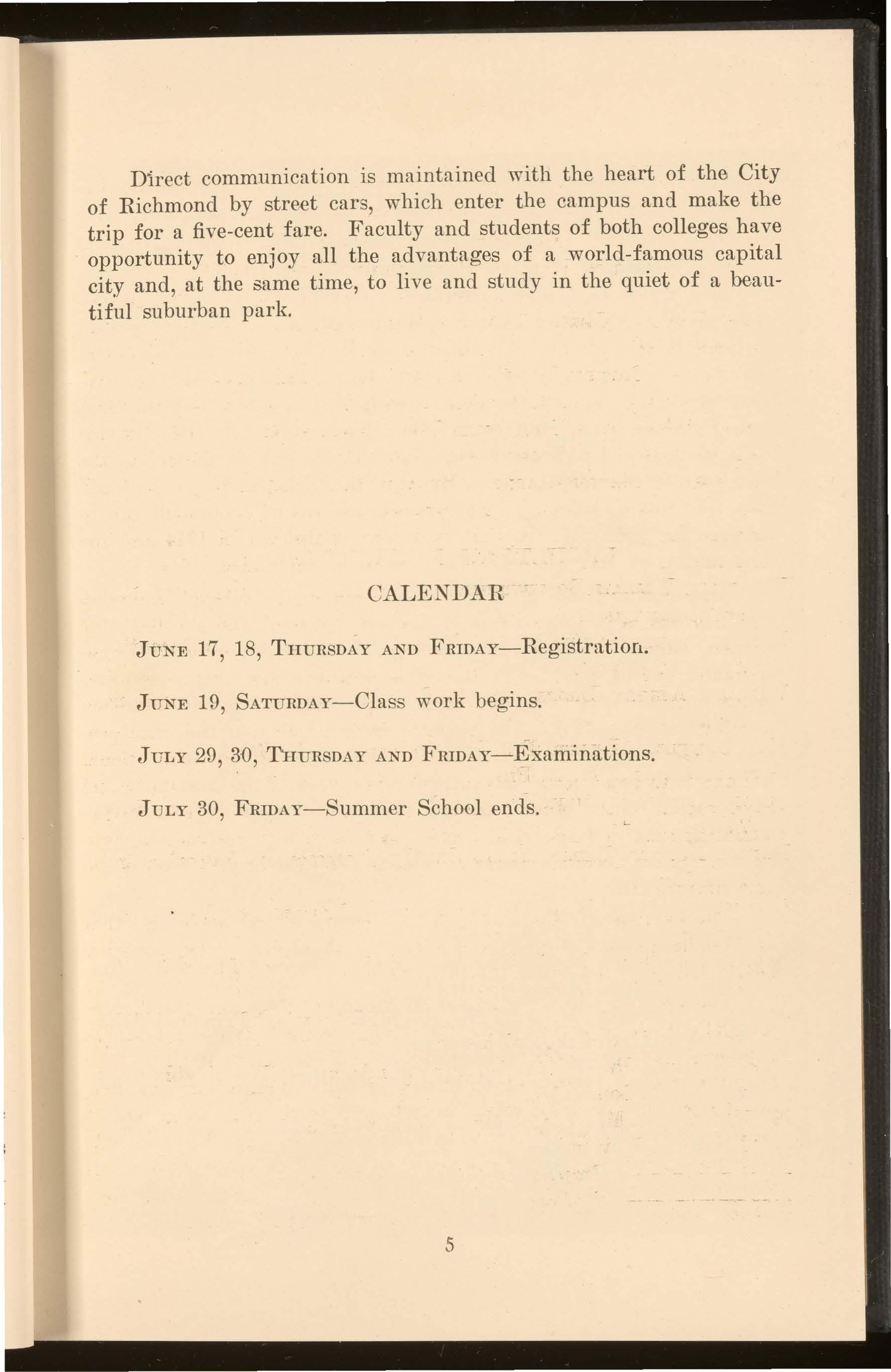
JuNE 17, 18, THURSDAYANDFmoAY-Registratiori.
JUNE 19, SATURDAY-Class work begins.
,JULY29, 30, THURSDAYANDFmDAY-Jt:xaminations.
JuLY 30, FRIDAY-Summer School ends.

ADMINISTRATIVEOFFICERS
FREDERICKWILLIAMBOATWRIGHT,M.A., LL. D., Pr esid ent
HENRYBRANTLYHANDY,M. A., Dir ector
DANIELBUNYANBRYAN,A. M., Pd. D., Associat e Dir ector.
BENJAMIN"WESTTAnn, Tr easur er and R egistr-ar
MARIONGARNETTRYLAND,B. A., B. s., Librarian
FREDERICKWILLIAMBOATWRIGHT,M. A., LL. D., Professor of Modern Languages.
RonERTEDwrn GAINES,M. A., Litt. D., Professor of Mathematics. Sp ecial Lecturer.
WrLLIAMAsnuRY HARRIS,M. A., Ph. D., Prof essor of Gre ek and Latin.
MAY LANSFIELDKELLER,Ph. D., Prof essor of English.
GARNETTRYLAND,M. A., Ph. D., Prof essor of Ch emistry.
SusAN ~L"-DELINELouGn, Ph. M., Prof essor of History and Political Science.
DANIELBUNYANBnYAN,M. A., Pd. D., Prof essor of Edu cation and Sociology.
CAROLINES. LuTz, B. A., M. A., Asso ciat e Prof essor- of English and Ger man.
SYDNEYS. HANDY,M. A., Prof essor of English and Education, St. John's College, Annapolis, Md.
JAMESC. I--fAuwooD,M. A., Prof essor of Edrucation, Principal John Marshall High School, Richmond, Va.
OTTo DcrNKEL,Ph. D., Prof essor of Mathematics Washincrton Uni' 0 versity, St. Louis, Mo.
H. H. SEAY,A. M., Instructor of Economics and Political Science Princeton University. '
-------, Prof essor of Romance Languages. -------, Prof essor of Romance languages.
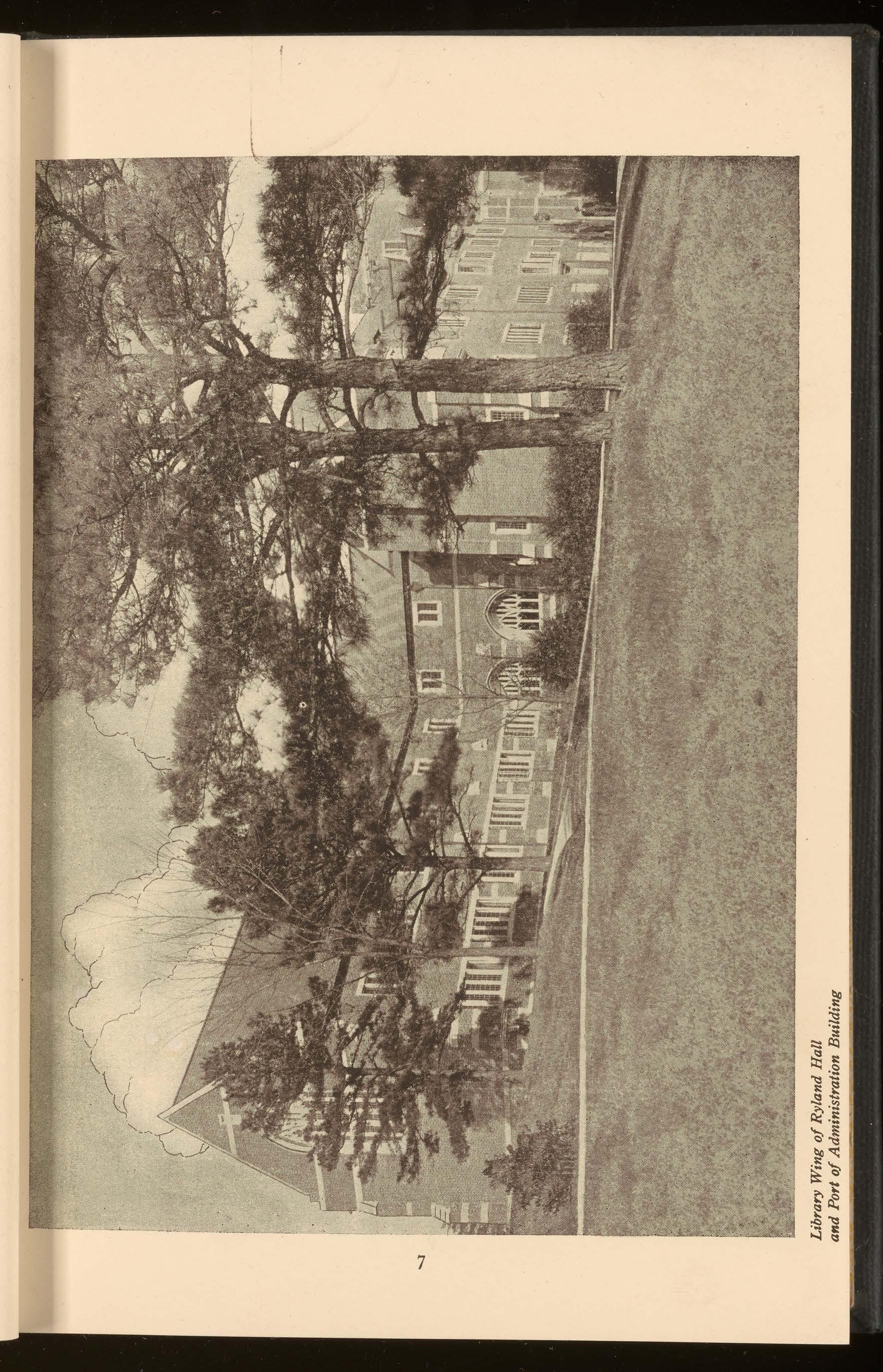
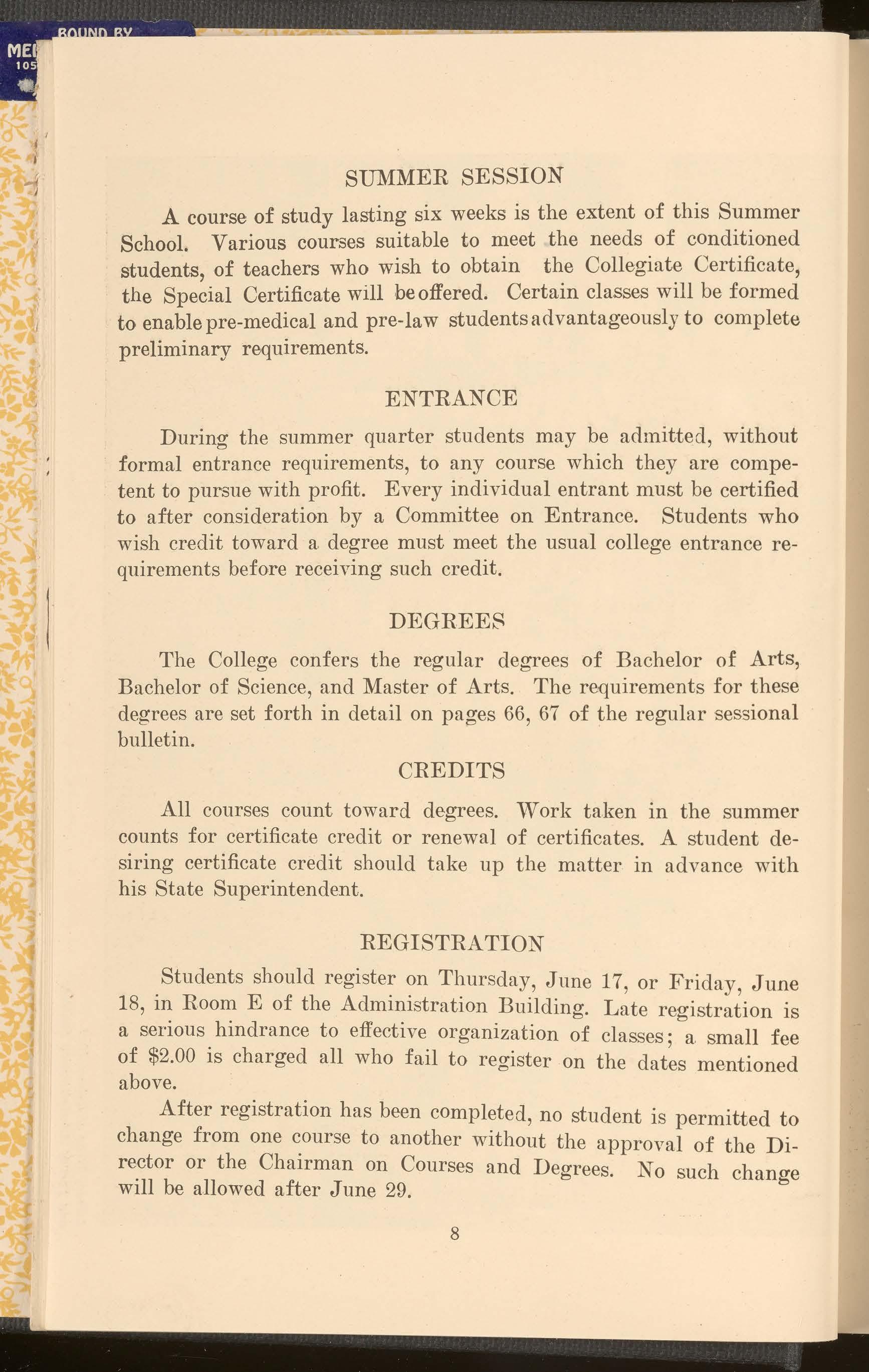
A course of study lasting six weeks is the extent of this Summer School. Various courses suitable to meet the needs of conditioned students, of teachers who wish to obtain the Collegiate Certificate, the Special Certificate will be offered. Certain classes will be formed to enable pre-medical and pre-law students advantageously to complete preliminary requirements.
During the summer quarter students may be admitted, without formal entrance requirements, to any course which they are competent to pursue with profit. Every individual entrant must be certified to after consideration by a Committee on Entrance. Students who wish credit toward a. degree must meet the usual college entrance requirements before receiving such credit.
The College confers the regular degrees of Bachelor of Arts, Bachelor of Science, and Master of Arts. The requirements for these degrees are set forth in detail on pages 66, 67 of the regular sessional bulletin.
All courses count toward degrees. Work taken in the summer counts for certificate credit or renewal of certificates. A student desiring certificate credit should take up the matter in advance with his State Superintendent.
_Students should registe: ?n Thursday, June 17, or Friday, June 18, m Room E of the Admm1stration Building. Late reo-istration is a serious hindrance to effective organization of classes• 0 a. small fee of $2.00 is charged all who fail to register on the dat~s mentioned above.
After registration has been completed, no student is permitted to change from one course to another without the approval of the Dire_ctor or the Chairman on Courses and Degrees. N O such change will be allowed after June 29.
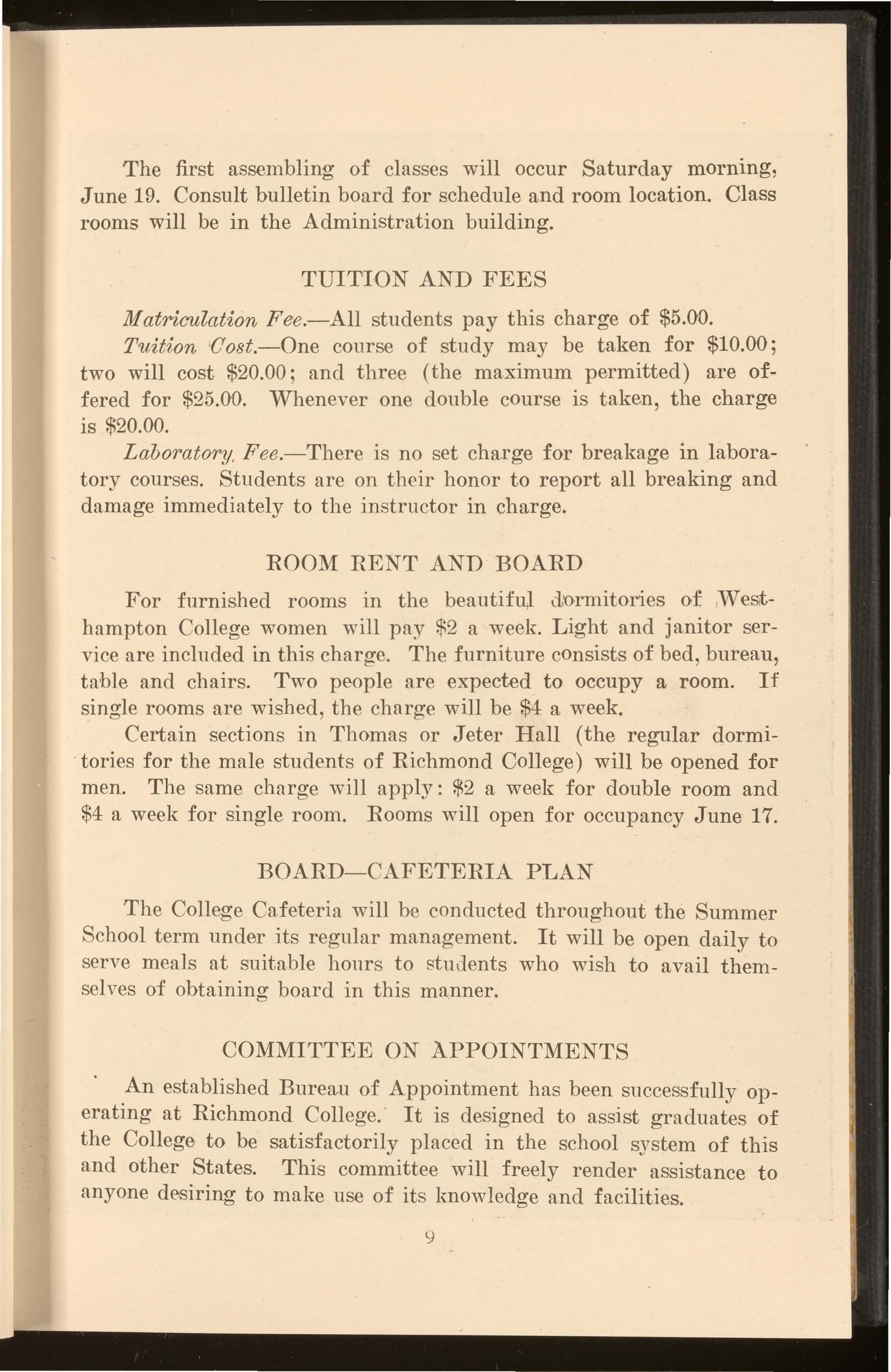
The first assembling of classes will occur Saturday morning, June 19. Consult bulletin board for schedule and room location. Class rooms will be in the Administration building.
Matriculation Fee.-All students pay this charge of $5.00. Tuition 'Oost.-One course of study may be taken for $10.00; two will cost $20.00; and three (the maximum permitted) are offered for $25.00. Whenever one double course is taken, the charge is $20.00.
Laboratory , F ee.-There is no set charge for breakage in laboratory courses. Students are on their honor to report all breaking and damage immediately to the instructor in charge.
For furnished rooms in the beautifu,l d;ormitories of ,""\Vesthampton College women will pay $2 a week. Light and janitor service are included in this charge. The furniture consists of bed, bureau, table and chairs. Two people are expected to occupy a room. If single rooms are wished, the charge will be $4 a week. Certain sections in Thomas or Jeter Hall (the regular dormitories for the male students of Richmond College) will be opened for men. The same charge will apply: $2 a week for double room and $4 a week for single room. Rooms will open for occupancy June 17.
The College Cafeteria will be conducted throughout the Summer School term under its regular management. It will be open daily to serve meals at suitable hours to students who wish to avail themselves o-f obtaining board in this ma nner.
An established Bureau of Appointment has been successfully operating at Richmond College. · It is designed to assist graduates of the College to be satisfactorily placed in the school system of this and other States. This committee will freely render assistance to anyone desiring to make use of its know ledge and facilities.
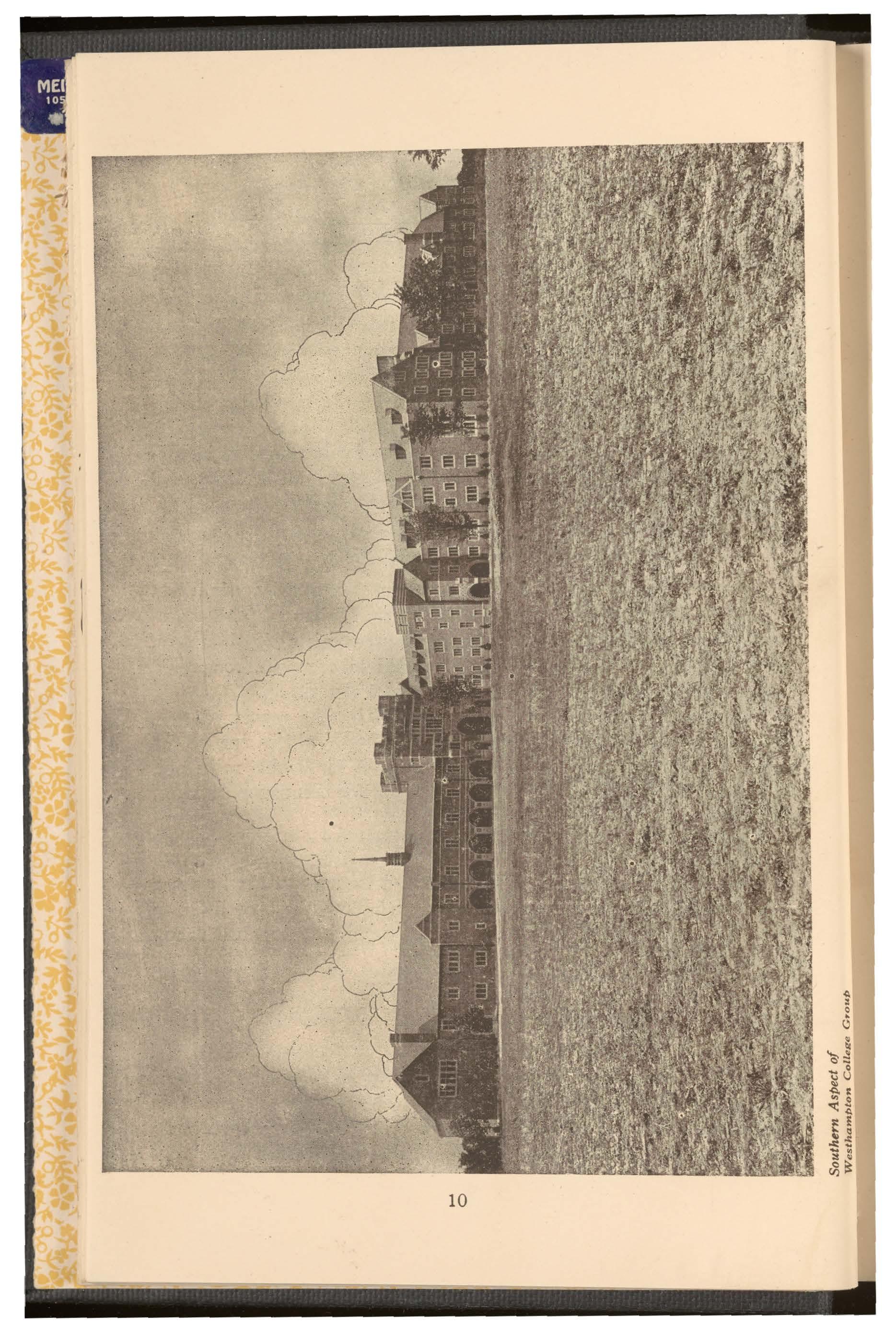

The s ale of books and conduct of the college post-office are both under the direction of a representative of Hunter & Co. Prompt attention and efficient service are th11s assured. The post-office address is Richmond College, Virginia.
As in regular session, to obtain credit for any course examination is necessary. The dates for these final tests will be July 29 and 30. Successful completion of a course of study, an · class-room requirements as well as examination, will be rewarded by credit and certificate.
At lea8t one evening a week the Summer School management will provide speakers of interest and ability-lecturers of state and national standing, men and women who have attained pre-eminent success in their chosen fields of endeavor. .These entertainments will frequently be held out of doors and the public will be invited.
Richmond and vicinity offer unusual opportunities in the way of historical education and social diversion. Nearby excursions to wellknown places of interest will be undertaken; many entertainments in the way of special speakers, choral music, dramatic performances, nnd outdoor pageantry are planned. Tennis, baseball, swimming, boating, and other athletic activities will be offered without fees.
For further information, address
DIRECTOR SUMMER SCHOOL, Richmond College, Virginia.
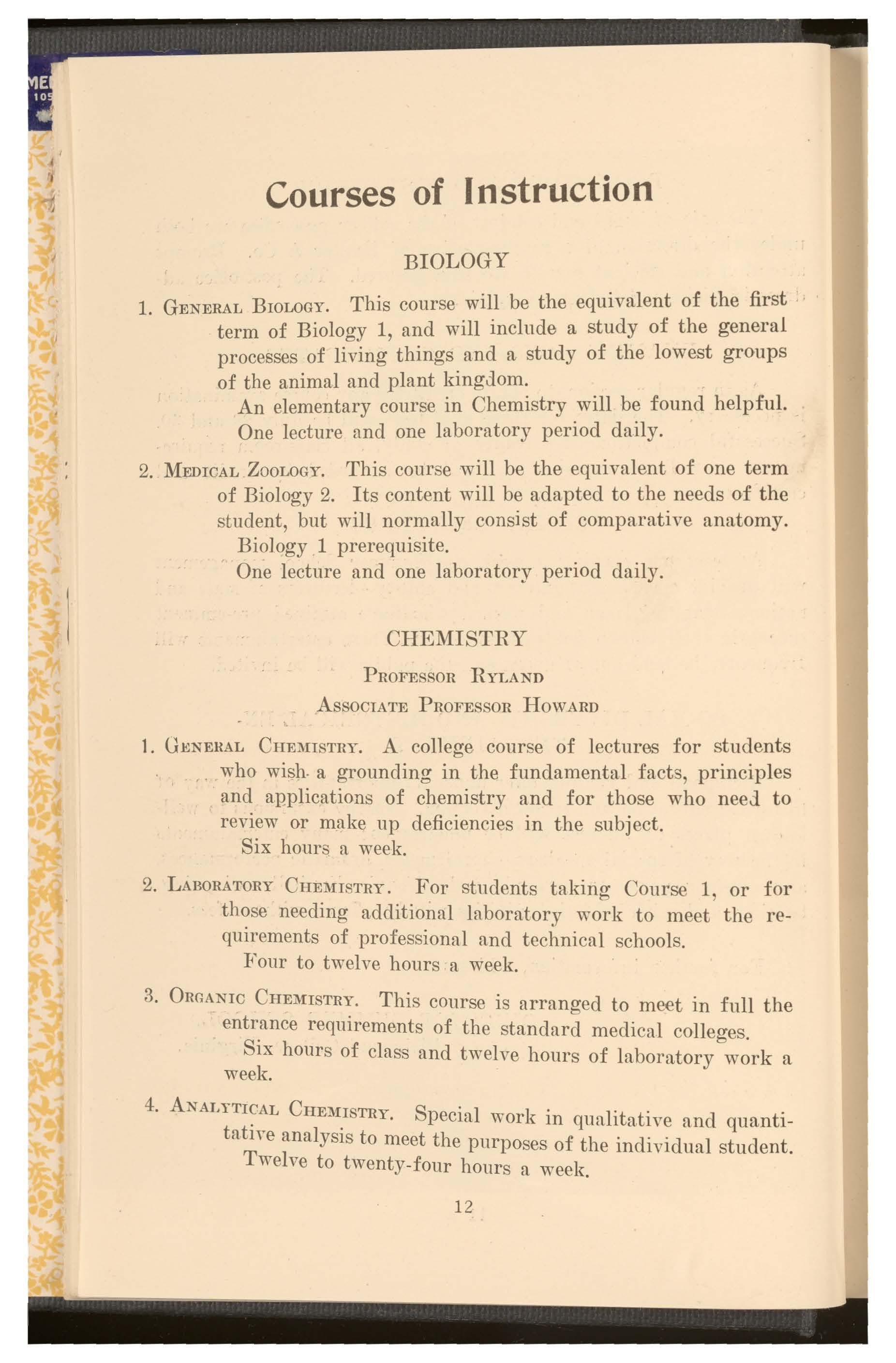
1. GENERALBIOLOGY. This course will be the equivalent of the first term of Biology 1, and will include a study of the general processes of living things and a study of the lowest groups of the animal and plant kingdom.
An elementary course in Chemistry will be found helpful. One lecture and one laboratory period daily.
2. MEDICALZooLOGY. This course will be the equivalent of one term of Biology 2. Its content will be adapted to the needs of the student, but will normally consist of comparative anatomy.
Biology 1 prerequisite.
One lecture and one laboratory period daily.
PROFESSORRYLAND
.AssocIATE PROFESSORHowARD
1. G1<:NERALCnEllIISTRY. A college course of lectures for students , . who wish . a grounding in the fundamental facts, principles and applications of chemistry and for those who neeJ to review or make up deficiencies in the subject.
Six hours a week.
2. LABORATORYCnEl\USTRY. For students ta kin a Course 1 or for b l those needing additional laboratory work to meet the requirements of professional and technical schools.
Four to twelve hours a week.
3. ORGANICCHEMISTRY.This course is arranged to meet in full the entr_ance requirements of the standard medical colleges.
Six hours of class and twelve hours of laboratory work a week.
4. ANALYTICALCHEMISTRY S · l l . 1· . . .. • pecia wor { m qua itative and quantitatn-e analysis to meet the purposes of the individual student .
Twelve to twenty-four hours a week .
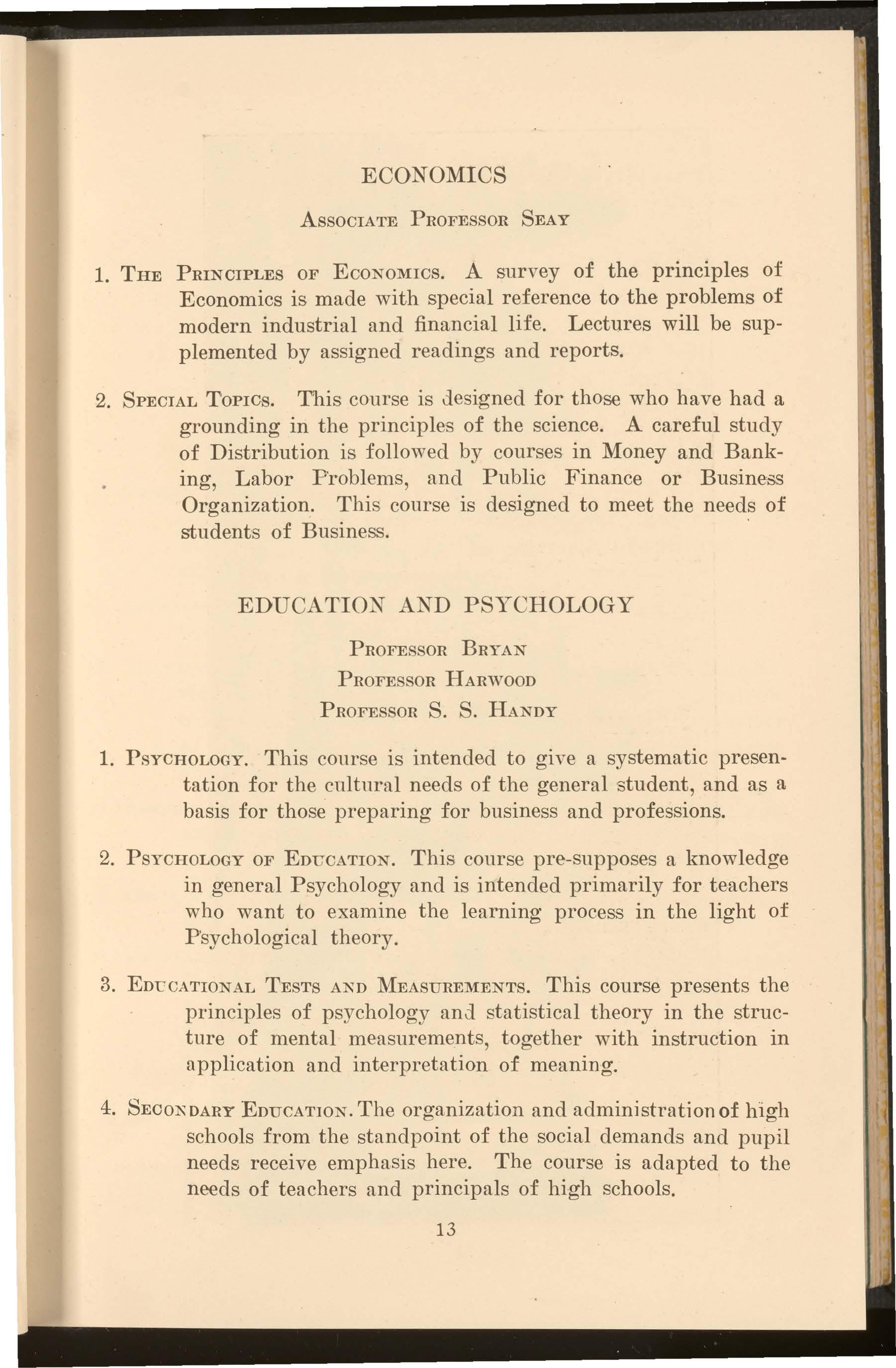
AssocrATE PROFESSORSEAY
1. THE PRINCIPLESOF EcoNoMrcs. A survey of the principles of Economics is made with special reference to the problems of modern industrial and financial life. Lectures will be supplemented by assigned readings and reports.
2. SPECIALToPics. This course is Jesigned for those who have had a grounding in the principles of the science. A careful study of Distribution is followed by courses in Money and Banking, Labor Problems, and Public Finance or Business Organization. This course is designed to meet the needs of students of Business.
PROFESSORBRYAN
PROFESSORHARWOOD PROFESSORS. s. HANDY
1. PsYCHOLOGY.This course is intended to giYe a systematic presentation for the cultural needs of the general student, and as a basis for those preparing for business and professions.
2. PSYCHOLOGYOF EDDCATION.This course pre-supposes a knowledge in general Psychology and is intended primarily for teachers who want to examine the learning process in the light of Psychological theory.
3. E01:-cATIONALTEsTs ANDMEASUREMENTS.This course presents the principles of psychology and statistical theory in the structure of mental measurements, together with instruction in application and interpretation of meaning.
4. SECONDARYEDUCATJON.The organization and administration of high schools from the standpoint of the social demands and pupil needs receive emphasis here. The course is adapted to the needs of teachers and principals of high schools.

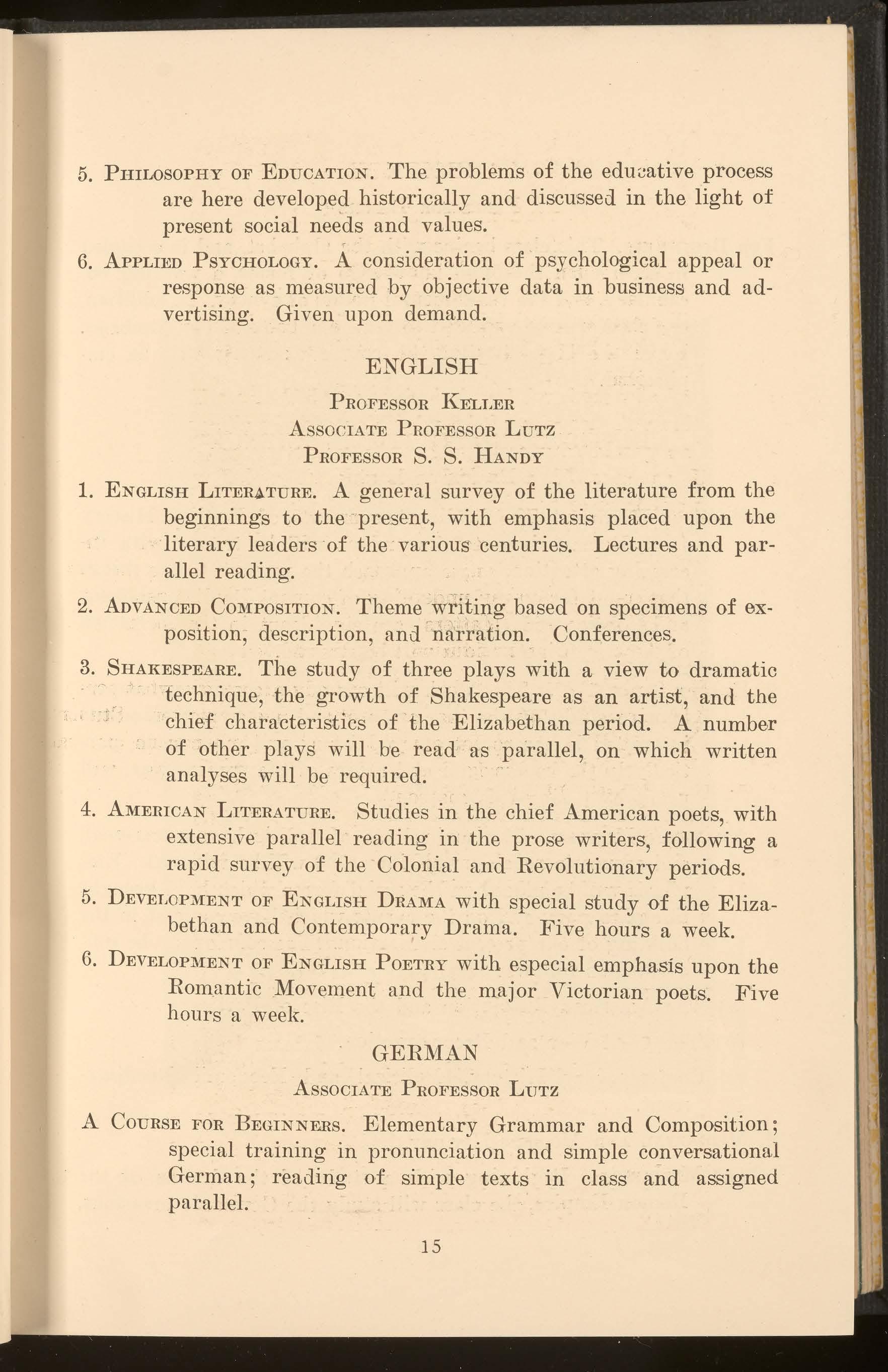
5. PHILOSOPHYOF EDUCATION.·The problems of the edu.:ative process are here developed historically and discussed in the light of present social needs and values.
6. APPLIEDPSYCHOLOGY.A consideration of psychological appeal or response as measur ed by objective data in business and advertising. Given upon demand.
PROFESSORKELLER
ASSOCIATEPROFESSORLUTZ
PROFESSORs. s. HANDY
1. ENGLISHLITEUTURE. A general survey of the literature from the beginnings to the ·present, with emphasis placed upon the literary leaders of the ·various centuries. Lectures and parallel reading.
2. ADVANCEDCOMPOSITION.Theme wr1ting based on specimens of exposition, description, and ·_na'r~ation. Conferences.
3. SHARESPEARE.The study of three plays with a view to dramatic .·.. technique, the growth of Shakespeare as an artist, and the chief characteristics of the Elizabethan period. A number of other plays will be read as parallel, on which written analyses will be required.
4. AMERICANLITERATURE.Studies in the chief American poets, with extensive parallel reading in the prose writers, following a rapid survey of the Colonial and Revolutionary periods.
5. DEVELOPMENTOF ENGLISH DRAMAwith special study of the Elizabethan and Contemporary Drama. Five hours a week.
6. DEVELOPMENTOF ENGLISH POETRYwith especial emphasis upon the Romantic Movement and the major Victorian poets. Five hours a week.
AssoCIATEPROFESSORLuTz
A CouRsE FOR BEGINNERS. Elementary Grammar and Composition; special training in pronunciation and simple conversational German; reading of simple texts in class and assigned parallel.
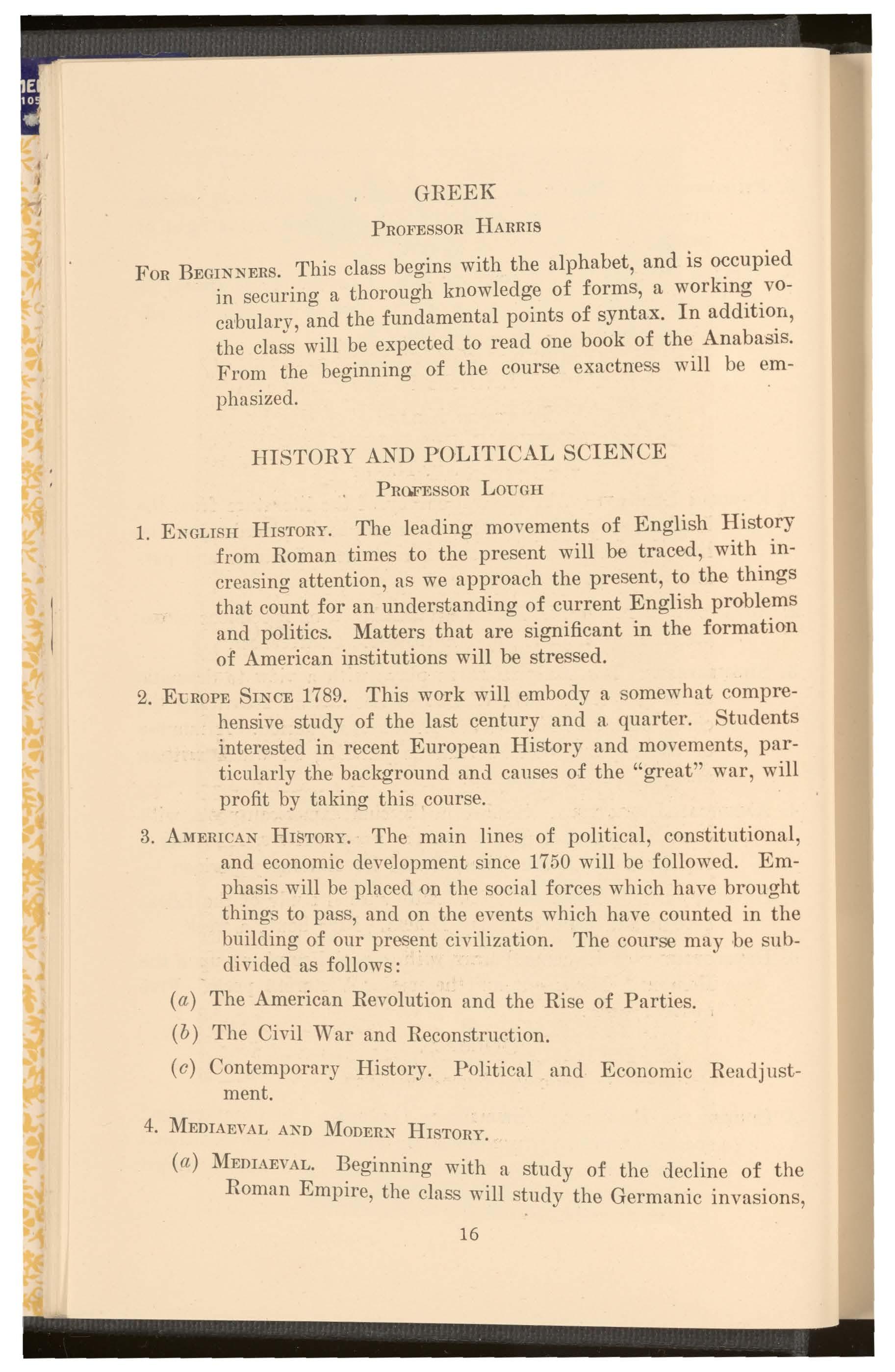
FoR BEGINNERS.This class begins with the alphabet, and is occupied in securing a thorough knowledge 0£ forms, a working vocabulary, and the fundamental points 0£ syntax. In addition, the class will be expected to read one book 0£ the Anabasis. From the beginning 0£ the course exactness will be emphasized.
1. ENGLISH HISTORY. The leading movements 0£ English History from Roman times to the present will be traced, with increasing attention, as we approach the present, to the things that count £or an understanding 0£ current English problems and politics. Matters that are significant in the formation of American institutions will be stressed.
2. ErnorE SINCE 1789. This work will embody a somewhat comprehensive study 0£ the last century and a. quarter. Students interested in recent European History and movements, particularly the background and causes 0£ the "great" war, will profit by taking this course.
3. AMERICANHISTORY. The main lines of political, constitutional, and economic development since 1750 will be followed. Emphasis will be placed on the social forces which have brouO'ht 0 things to pass, and on the events which have counted in the building of onr present civilization. The course may be subdivided as follows:
(a) The American Revolution and the Rise 0£ Parties.
(b) The Civil War and Reconstruction.
(c) Contemporary History. Political and Economic Readjustment.
4. MEDIAEVALAND MooER:N"HISTORY.
(a) MEDIAEVAL.~eginning with a study 0£ the decline 0£ the Roman Emp1re, the class will study the Germanic invasions,
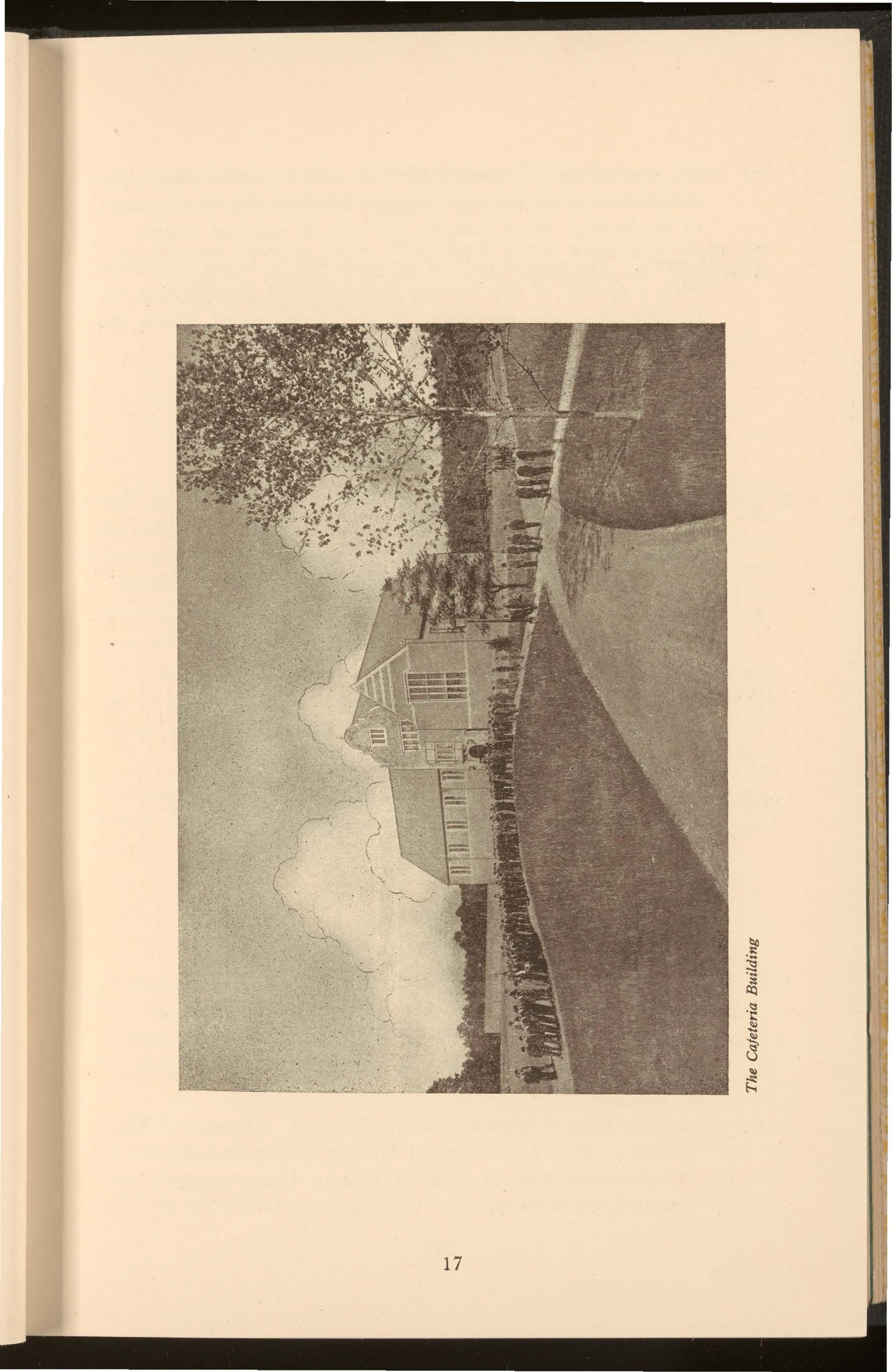
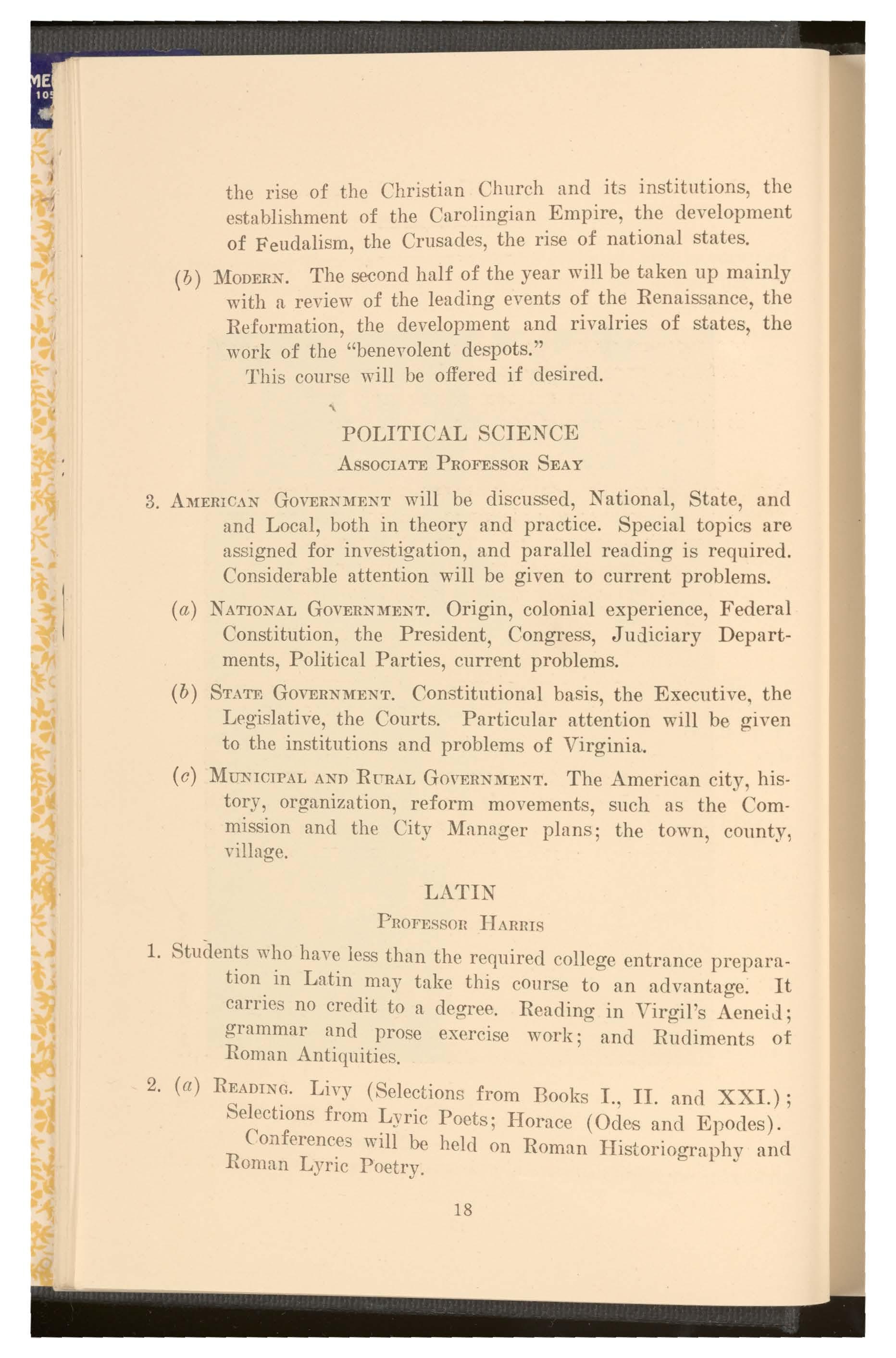
(b) the rise of the Christian Church and its institutions, the establishment of the Carolingian Empire, the dHelopment of Feudalism, the Crusades, the rise of national states.
MooERN. The second half of the year will be taken up mainly with a review of the leading events of the Renaissance, the Reformation, the development and rivalries of states, the work of the "benevolent despots." This course will be offered if desired.
3. Al\rnmc.,N GoVERNl\rnNTwill be discussed, National, State, and and Local, both in theory and practice. Special topics are assigned for investigation, and parallel reading is required. Considerable attention will be given to current problems.
(a) NATIONALGovERNl\H,NT.Origin, colonial experience, Federal Constitution, the President, Congress, Judiciary Departments, Political Parties, current problems.
(b) STATEGOVERNMENT.Constitutional basis, the Executive, the Legislative, the Courts. Particular attention will be giYen to the institutions and problems of Virginia.
(c) MUN1CTPALANDRt:RALGm 'ERNMENT. The American city, history, organization, reform movements, such as the Commission and the City Mnnnger plnns; the town, county, village.
PnoFEsson ILrn1us
1. Stuclen~s wl:o hay~ less thnn the required college entrnnce preparat10n m Lntm may take this course to an advantage. It carries no credit to a degree. Reading in Virgil's Aeneid; grnmmar and prose exercise work; and Rudiments of Ronrnn Antiquities.
2. (a) READIN?. LiYy (Selections from Books I., II. and XXL); Selcct10ns from ~yric Poets; Horace ( Odes and Epodes). Conferences mll be held on Roman Historiography and Roman Lyric Poetry.
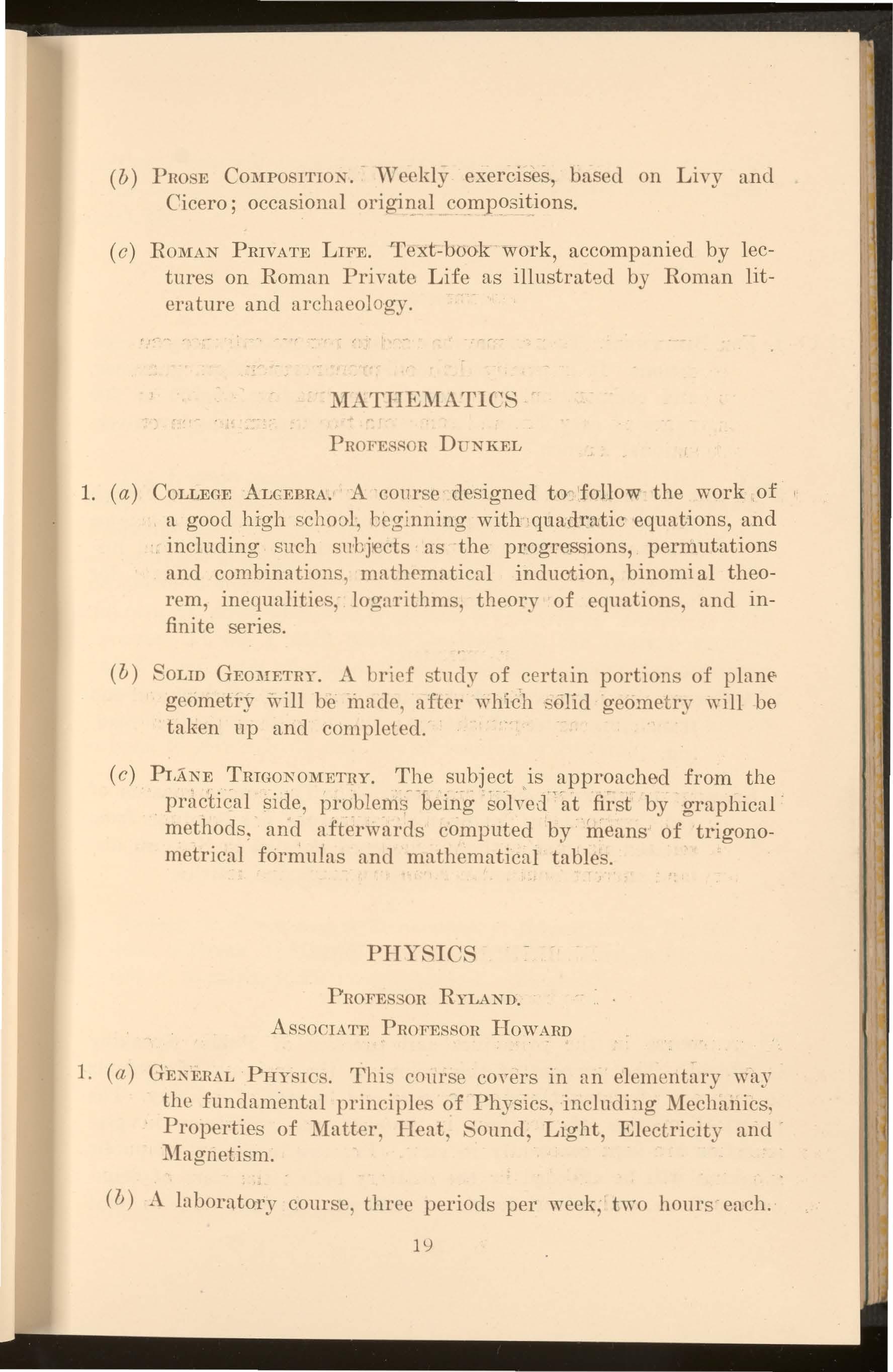
( b) PROSE CoMPOSITION. ,Y eckly exercises, based on Livy and Cicero; occasional original compositions.
(c) RoMAN PmvATE Ln""E. Text-book work, accompanied by lectures on Roman Private Life as illustrati.=icl by Roman literature and archaeol o gy.
1. (a) CoLLEGEALGEBRA. A co11rse designed to ~ follow the work of , a good high school, beginning with ,quadratic equations, and including such snbj~cts as the progressions, permutations and combinations , mathematical induotion, binomial theorem, inequalities, logarithms, theory of equations, and infinite series.
( b) SoLio GEmrnTRY. A brief stncly of certain portions of plan€' geometry will be 1'nadc, after wh'ich solid geometry will be taken up and completed.
(c) PT,ANE TmGoNOMETRY. The subject is approached from the practical side, problern s- bein -g solYed ' at fii·st by graphical methods, and afterwards computed by means of trigonometrical formulas and mathematical tables.
PROFESSORR 11.,AND. AssocrATE PRoFEsson HowARo
1 (a) GEXERALPHYSICS. This course coYers in an elementary way the fundamental principles of Physics, including Mechanics, Properties of Matter, Heat, Sound, Light, Electricity and · Magnetism.
(b) A laboratory course, three periods per week, two hours each.
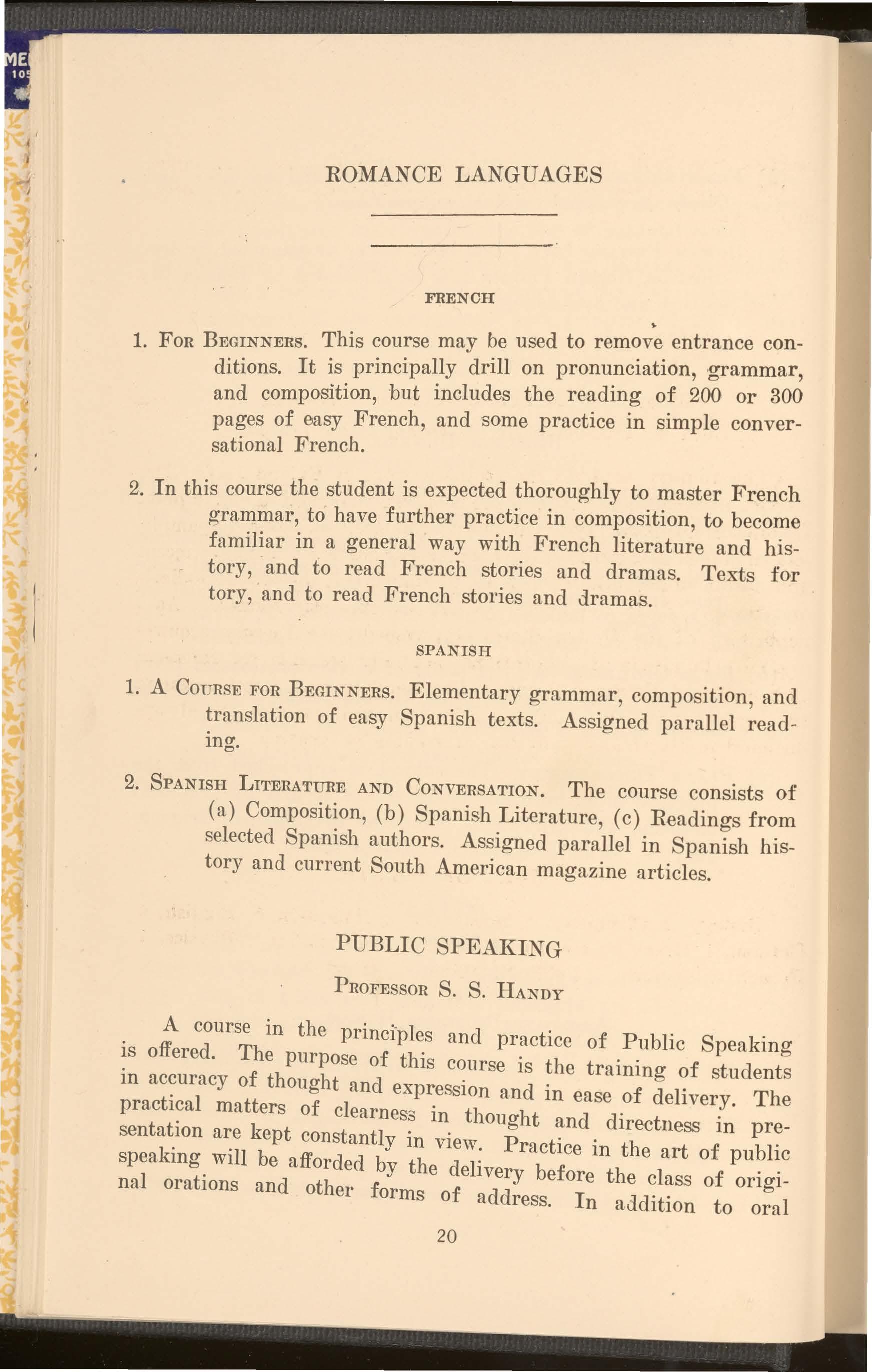
1. FoR BEGINNERS.This course may be used to remove entrance conditions. It is principally drill on pronunciation, ,grammar, and composition, but includes the reading of 200 or 300 pages of easy French, and some practice in simple conversational French.
2. In this course the student is expected thoroughly to master French grammar, to have further practice in composition, to become familiar in a general way with French literature and history, and to read French stories and dramas. Texts for tory, and to read French stories and dramas.
1. A CouRSEFORBEGINNERS.Elementary grammar, composition, and translation of easy Spanish texts. Assigned parallel reading.
2. SPANISHLITERATUREAND CONVERSATION.The course consists of (a) Composition, (b) Spanish Literature, ( c) Readings from selected Spanish authors. Assigned parallel in Spanish history and current South American magazine articles.
PROFESSORs. s. HANDY
. A course in the principles and practice of Public Speaking ~s offered. The purpose of this course is the training of students m ac~uracy of thought and expression and in ease of delivery. The practi?al matters of clearness in thought and directness in presenta~10n a~e kept constantly in view. Practice in the art of public speakmg will be afforded by the delivery befor th 1 f · · e e c ass o or1g1- nal orat10ns and other forms of address I dd't• I . n a 1 10n to ora
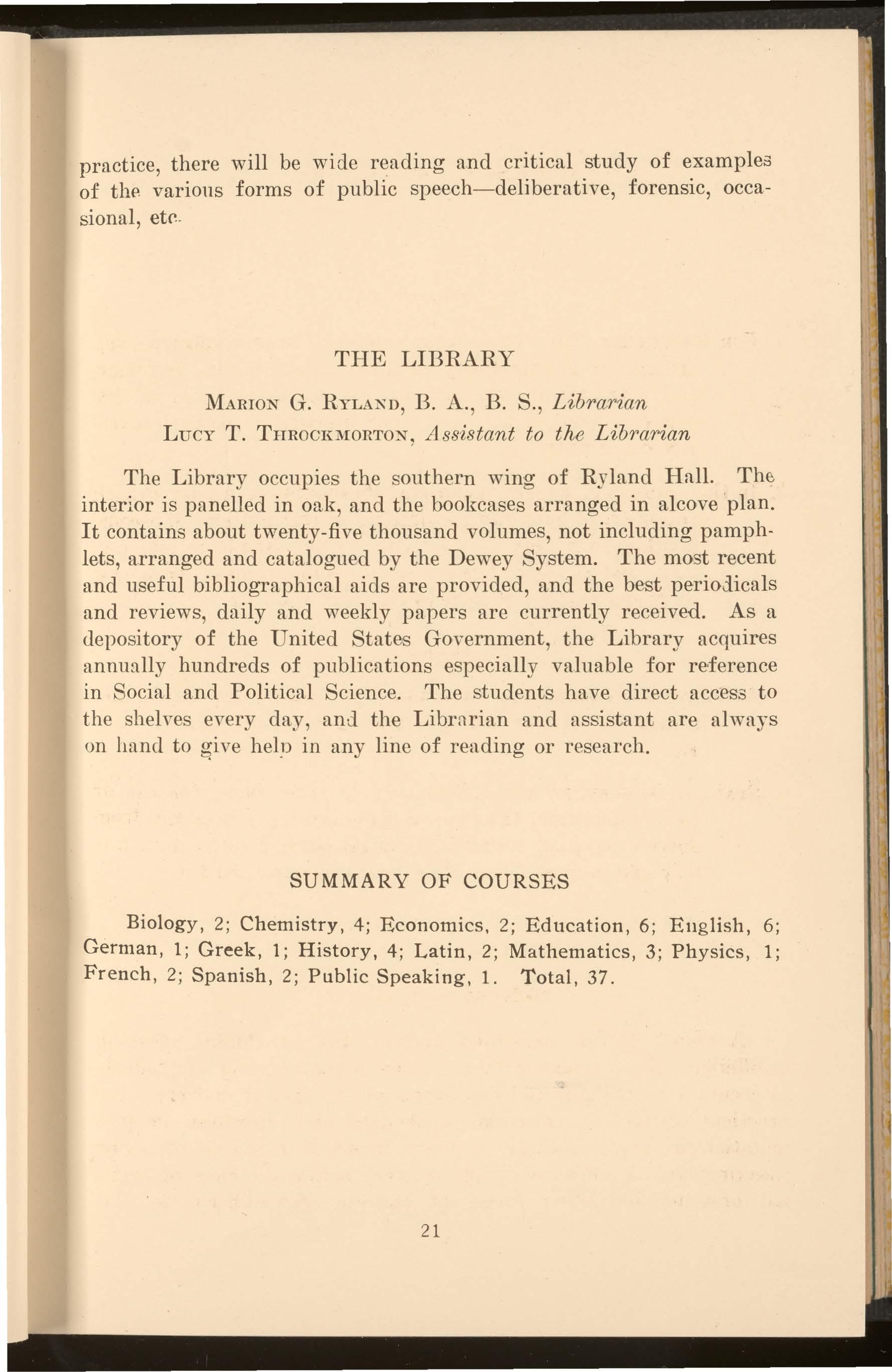
practice, there will be wide reading and critical study of examples of thr. various forms of public speech-deliberative, forensic, occasional, etr.-
MARION G. RYLA:irn, B. A., B. S., Librarian
Lucy T. TnROCKMORTON, Assistant to the Librarian
The Library occupies the southern wing of Ryland Hall. The, interior is panelled in oak, and the bookcases arranged in alcove plan. It contains about twenty-five thousand volumes, not including pamphlets, arranged and catalogued by the Dewey System. The most recent and useful bibliographical aids are provided, and the best perioJicals and reviews, daily and weekly papers are currently received. As a <lepository of the United States Government, the Library acquires annually hundreds of publications especially valuable for reference in Social and Political Science. The students have direct accesa to the shelves every day, and the Librnrian and assistant are always on hand to give hel)) in any line of reading or research.
Biology, 2; Chemistry, 4; Economics, 2; Education, 6; English, 6; German, l; Greek, 1; History, 4; Latin, 2; Mathematics, 3; Physics, 1; French, 2; Spanish, 2; Public Speaking, 1. Total, 37.